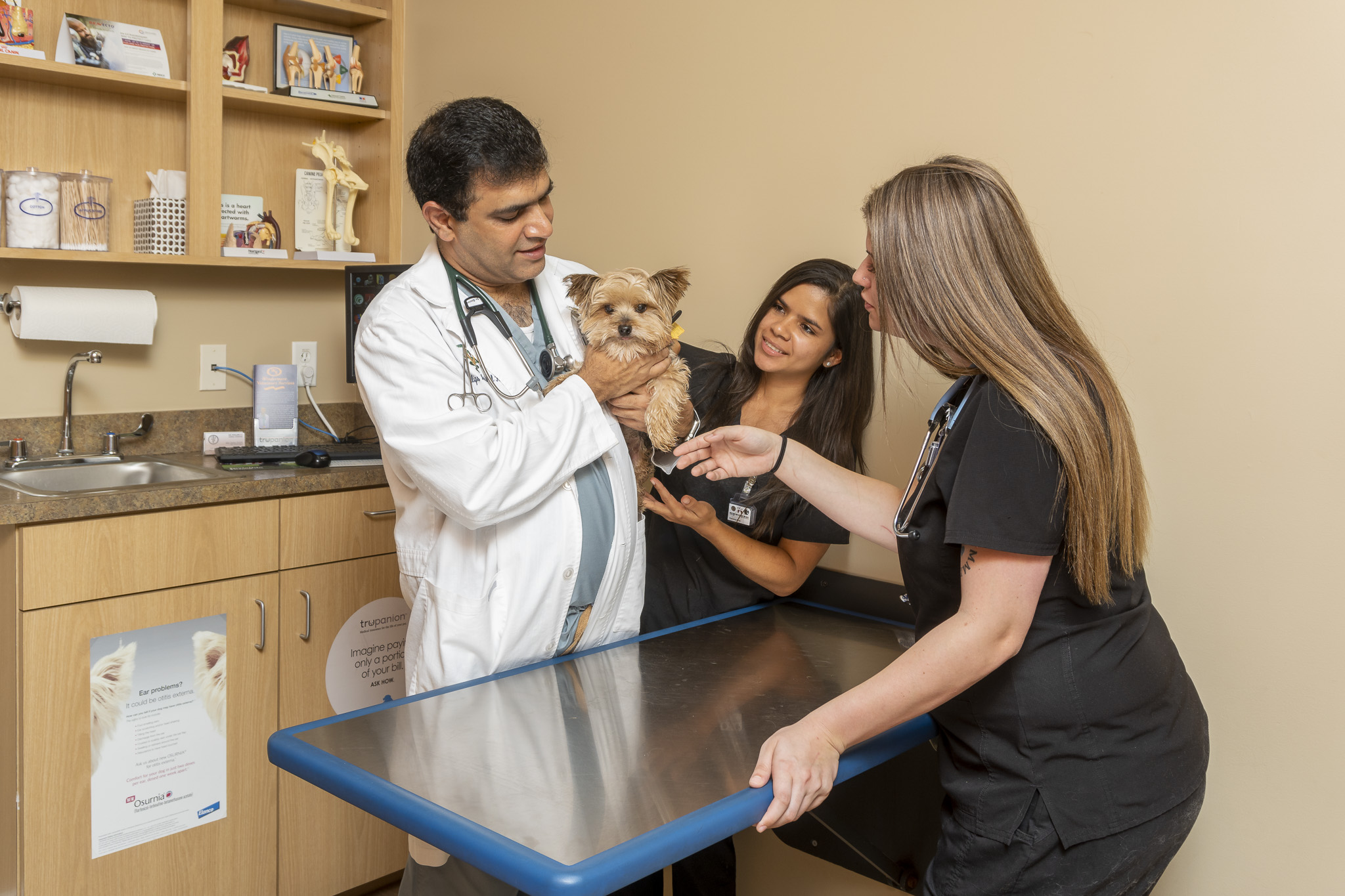
We're here for you
Emergency?
If your pet is exhibiting concerning symptoms or experiencing a medical emergency, please call our clinic at (407) 352-2579. We’ll help you through it.
Cats peeing everywhere can be bothersome. They may start staining the carpet, or even the couch or bedsheets. Cat urine may also have a caustic smell that is difficult to remove. If you notice your cat is not peeing outside or in a litter box, you’ll need to observe their behavior before you can address the root cause of the problem.
If your cat only peed a couple of times in an unusual spot, there may not be cause for concern. Accidents can happen. However, if you notice this occurring often you’ll need to reach out to a vet who can help you find the root cause.
Common Reasons Your Cat Is Peeing Everywhere

Cats can pee in inappropriate locations for a variety of reasons. It could be as simple as behavioral stress and anxiety, or it could be indicative of a bladder condition. To understand the exact cause you’ll need to evaluate all of the symptoms associated with the excess pee.
Stress and Anxiety
A lot of things can trigger stress or anxiety in a cat. It may be that the reaction is due to a new addition to the pet family that is disrupting their normal routine, or it could be that there are too many strangers coming in and out of your home. These environmental changes may cause your cat to sneak away and pee in unsuspecting places. It could also cause them to rebel as an act of dominance against the environmental change that is bothering them. If you suspect that they’re peeing everywhere because of stress, you’ll need to start observing your environment to find the culprit.
Unclean Litter Box
We humans don’t like it when our bathrooms are unclean, and cats don’t like it when theirs are dirty either. If a litter box hasn’t been cleaned or emptied in a while, the dirt and grime will start to build up and create a rancid smell. This dirty environment may cause your cat to avoid going to the bathroom in their litter box, and cause them to start peeing elsewhere.
Medical Condition
Unfortunately, a urinary problem could be caused by a deeper medical issue. To determine if a medical condition is at play, you will need to observe if they are having any other troubling symptoms and visit a vet for proper testing and diagnosis.
Urinary Tract Infection
When bacteria in the urinary tract build up, it can cause pain and inflammation at the site. This could make it uncomfortable for your cat to pee, causing them to start peeing in different locations. If a urinary tract infection (UTI) is present, your vet will likely prescribe antibiotics and fluids to reduce the inflammation and bacterial overgrowth.
Bladder Stone Blockage
To determine if excess urination is caused by bladder stones, your cat will need an x-ray from a veterinary technician. An x-ray will show if there is a stone blockage creating the irritation. Antibiotics or surgery may be necessary for treatment, depending on the severity of the blockage.
Metabolic Disease
Illnesses such as kidney or liver disease can often occur simultaneously. These metabolic health problems can cause increased urination and a lack of bladder control as your cat’s vital organs become inflamed. To confirm if your cat has a metabolic disease, you will need to see a vet for some blood work.
How Can I Stop My Cat From Peeing Everywhere?
While your cat peeing everything can be frustrating, it’s important to consider that it might be frustrating for them too. They could be experiencing underlying medical pain, or become agitated, just like humans can. Depending on the cause of your cat peeing everywhere, there are a few options for you and a vet to consider to help encourage your cat to pee in a litter box.
Clean the Litter Box Often
If the litter box is not clean, your cat may decide to make another part of your home unclean, too. Always empty and clean your cat’s litter box to keep it a healthy and clean environment for your cat to pee.
Reduce Environmental Stress
If there is stress in your home, such as from a new puppy living alongside your cat, you’ll need to work with a professional to find new training methods to soothe the tension. Start by finding what is triggering your cat's behavior and find ways to mitigate excess exposure and anxiety. If your cat feels safe and calm, they will start peeing in a normal routine again.
Consult With a Vet
If a minor behavioral problem is not causing unusual peeing behaviors, you’ll need to consult with a vet for more testing. A vet can ensure the proper testing, diagnosis, and treatment of any underlying medical concerns. When in doubt, always consult with a professional for advice on the safety and longevity of your cat.

Step One:
Call us to book your pet’s appointment.

Step Two:
Our expert vet will take care of all of your pet’s needs.

Step Three:
Get back to enjoying your happy and healthy life with your furry best friend.

Get the Best Care for Your Pet
Come Visit Dr. Qasim
Book your pet’s appointment with Dr. Qasim to ensure a long, happy life together.

We love and care for each patient as if they were our own pet.
Meet Our Team of Animal Lovers
Dr. Bilal Qasim, DVM, established Dr. Phillips Animal Hospital in 2011 after practicing veterinary medicine for over 17 years with the help of talented and caring veterinary technicians.


